The Joke of Eradicating Online Gambling
The investigation into the Communication and Digital Affairs Ministry employees backing online gambling is expanded to include many people. Ill-gotten gains from a political operation.
maaf email atau password anda salah
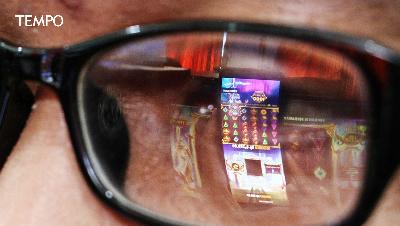
The investigation into the Communication and Digital Affairs Ministry employees backing online gambling is expanded to include many people. Ill-gotten gains from a political operation.
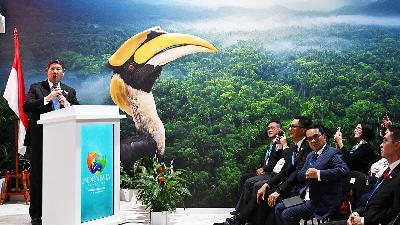
The presence of Hashim Djojohadikusumo at COP29 in Azerbaijan was considered as bearing a conflict of interests. He was promoting the business of Arsari Group.
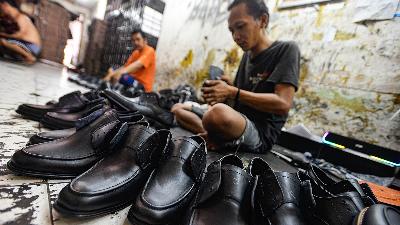
The disbursement of People’s Business Credit faces numerous challenges. Farmers and small business owners are vulnerable to loan sharks and middlemen.
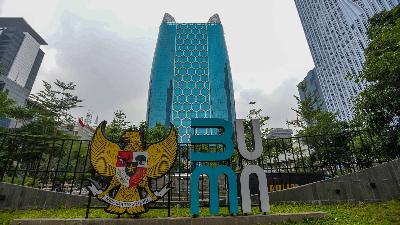
The plan for a super-holding for state-owned enterprises dates back to the New Order era. The SOEs Ministry will be replaced by a giant corporation.
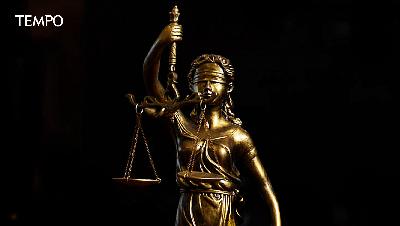
With the Supreme Court’s judicial mafia, when one branch is lopped off, another 10 grow in its place. It needs to be comprehensively cleaned up.

The Supreme Court dismissed three judges suspected of accepting bribes in the Ronald Tannur case. This adversely impacts efforts to improve the judiciary.
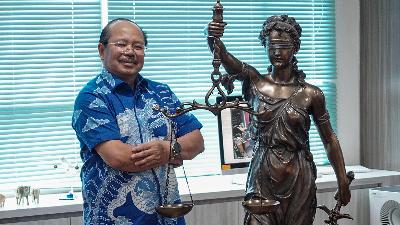
Judicial Commission Chair Amzulian Rifai on the corruption in judicial institution involving judges.

Driven by corporate demand, helicopter business opportunities continue to grow. Operators are increasingly expanding their fleets.

There is an increasingly real threat to Indonesia’s biodiversity. It cannot be overcome through empty slogans at international forums.
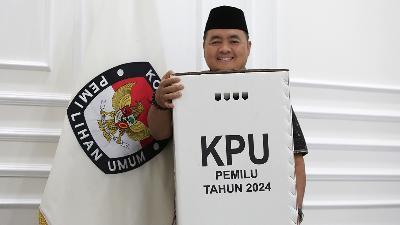
KPU Chair Mochammad Afifuddin on turbulence within his institution following the dismissal of Hasyim Asy’ari, and the Constitutional Court’s decision on the regional head elections.
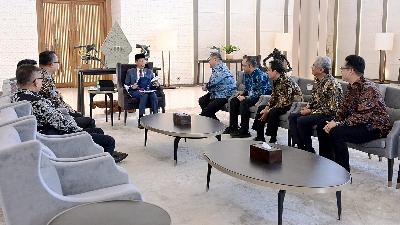
Various parties from the National Police Chief to the State Palace are accused of interfering in the KPK leadership candidates selection process. The candidates are divided into four clusters.
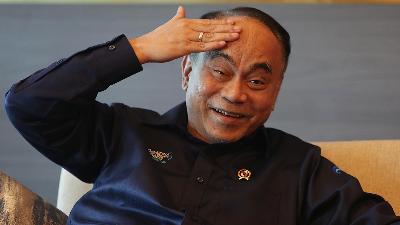
Tempo’s interview with Minister of Communication and Informatics Budi Arie Setiadi about Jokowi’s campaign before the end of his tenure.

As President Jokowi's term neared its end, instructions were given to promote the government's achievements, and billions of rupiah in contracts were offered to the media.
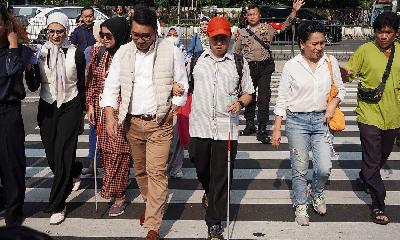
Jakarta governor and deputy governor candidates promise improvements in inclusive public transportation.
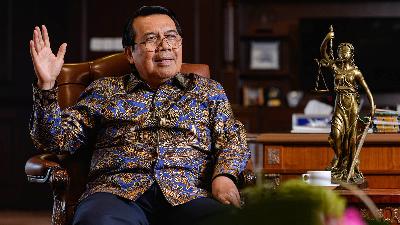
Supreme Court Chief Justice Muhammad Syarifuddin uses artificial intelligence to handle cases. Case brokers continue to be a threat.
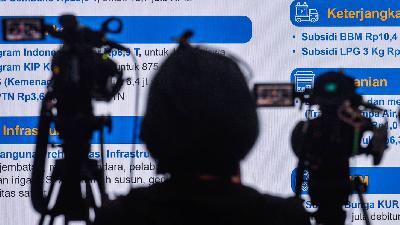
Media companies are experiencing upheaval due to the rapid changes in the business landscape. The industry is moving towards a new equilibrium.

Using a variety of pretexts, the political parties replace elected legislative candidates. This is a betrayal of the people’s choice.
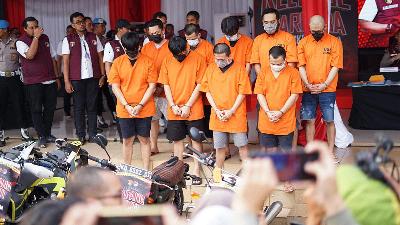
Hendra Sabarudin’s drug network distributed methamphetamine from Tarakan prison starting in 2017, allegedly aided by police and prison guards.

The government plans to dredge 17.6 billion cubic meters of sea sand and sediment, altering the landscape and destroying marine life.
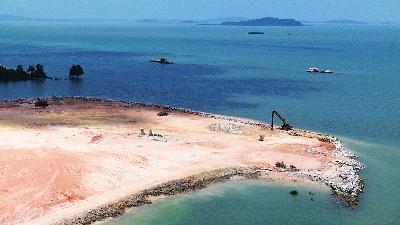
The government designated a number of areas as zones for cleaning sediment and sea sand.

Anindya Bakrie ousts Arsjad Rasjid from the position of General Chair of the Indonesian Chamber of Commerce and Industry (Kadin). The Palace’s support shifted.
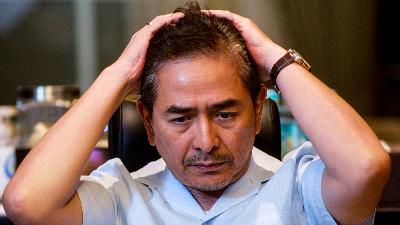
Anindya Bakrie ousted Arsjad Rasjid as the Chair of the Indonesian Chamber of Commerce and Industry (Kadin). The organization is becoming like a political party and enjoys large funds coming in from overseas.

Gubernatorial candidates are trying to win over the votes of Anies Baswedan supporters in the Jakarta regional election. Jokowi reportedly shifted his support.

Pramono Anung and Ridwan Kamil shed light on the dynamics surrounding their appointments as Jakarta gubernatorial candidates.
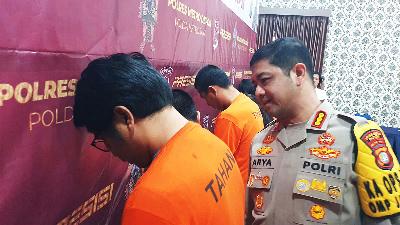
Police uncover baby trafficking syndicate operating in Java-Bali since 2023. Five babies were already sold.
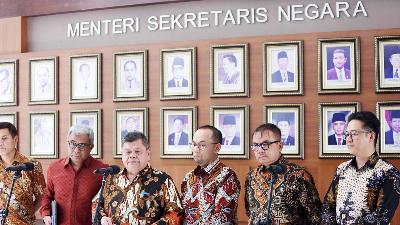
News summary on the conflict of interest of KPK leadership candidates and 44 ministries in Prabowo’s government.
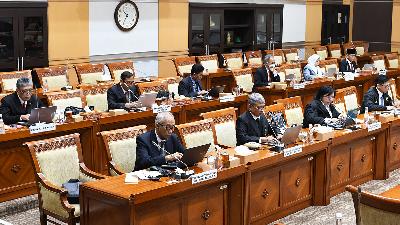
Commission III of the House of Representatives rejected all the Supreme Court judge candidates proposed by the Judicial Commission. The rejection allegedly was due to their favored candidate failed to pass.
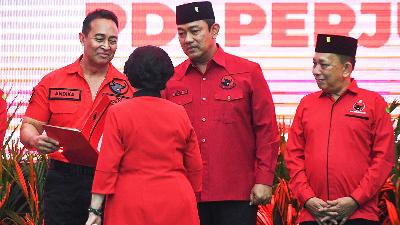
The Indonesian Democratic Party of Struggle (PDIP) strives to counter candidates supported by the Palace. It is an early projection for the 2029 General Elections.
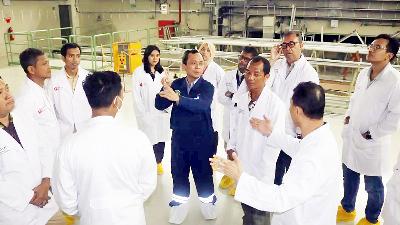
BRIN is designing the Peluit-40 nuclear reactor to replace diesel power plants, claiming it to be safer.
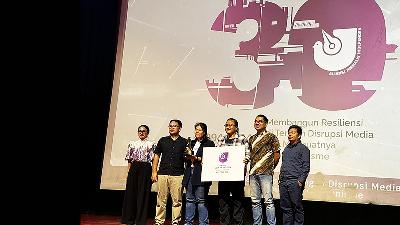
The Bocor Alus Politik podcast receives the Udin Award that we dedicate to our viewers and readers.
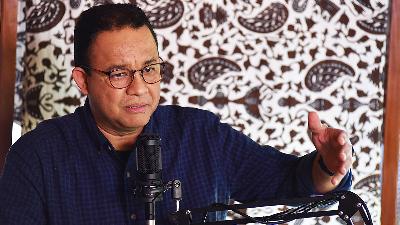
An exclusive Tempo interview with Anies Baswedan regarding his chances to run in the Jakarta regional head election.

Jokowi and Prabowo’s coalition are maneuvering to thwart Anies Baswedan’s candidacy in the Jakarta regional head election. Cabinet posts are being offered as inducements.

Tommy Hermawan Lo’s name emerges following the mention of Mr. T in online gambling that involves human trafficking case. He is a director at a casino management company.
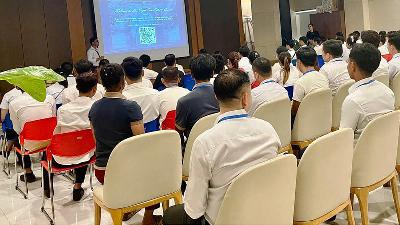
Victims of human trafficking for online gambling and scamming in Cambodia claimed of being forced to work 12-hour shifts and being beaten. Recruitment is still ongoing.
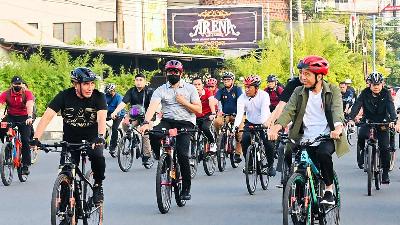
The battle in the presidential election is set to continue in regional head elections. The PDI-P is determined to challenge President Joko Widodo’s candidates.
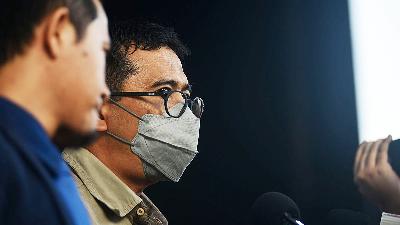
Personal protective equipment corruption suspect, Budi Sylvana, denied inflicting up to Rp300 billion of losses to the state. He revealed the roles of other officials in the case.
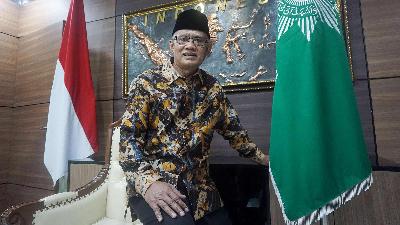
Muhammadiyah follows Nahdlatul Ulama’s step to accept mining concession offer from the government. Muhammadiyah General Chair Haedar Nashir explains about it.
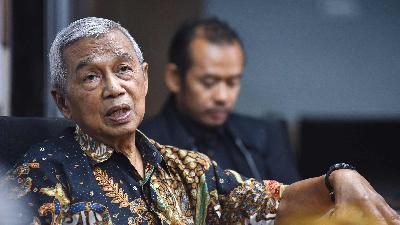
Muhammadiyah accepts the government’s mining concession offer. Many members are against it. Busyro Muqoddas, Chair of Muhammadiyah’s Law and Human Rights Council explains.

Muhammadiyah cadres and administrators are divided in their response to the mining concession. There are whispers from the government and the entrepreneurs.

Retno Marsudi dismissed the idea that the government is merely meddling foreign affairs. She emphasized that Indonesia is a trusted partner on the international stage.
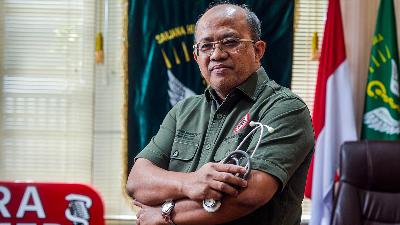
Chair of IDI, Mohammad Adib Khumaidi, discusses the polemic over the plan to allow foreign doctors to practice in Indonesia. He emphasizes stringent regulations are necessary.
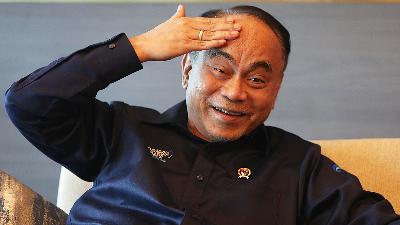
Communication and Informatics Minister Budi Arie explains the cyberattack on the Temporary National Data Center. He dismisses allegations of negligence.

Infinite Earth responds regarding the revocation of Rimba Raya Conservation’s ecosystem restoration permit.

There will be a wave of layoffs at Tokopedia as a result of inefficient practices. This is the result of government policy rife with conflicts of interest.
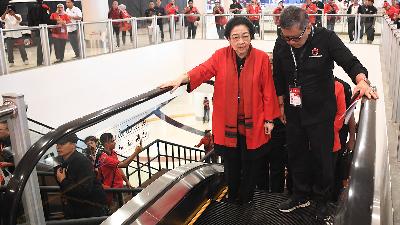
The PDI-P is preparing to replace Hasto Kristiyanto after he was questioned by the KPK in the Harun Masiku case. They are wary of the Palace’s interference.
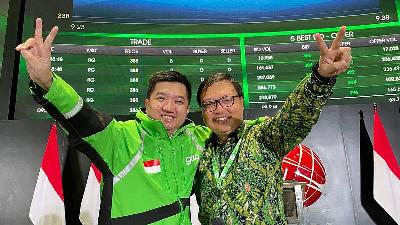
The founders of GoTo and Tokopedia sold their shares. New investors now have control of ownership.

Tokopedia made significant cuts in its workforce following its business consolidation with TikTok. A consequence of inefficient business operation.

Muhammadiyah’s business networks cover various sectors, from education to financial services. It seeks to create a closed economic ecosystem.

Muhammadiyah withdrew trillions of rupiah from Bank Syariah Indonesia. It was the accumulation of various problems, from operational matters to appointment of commissioners.
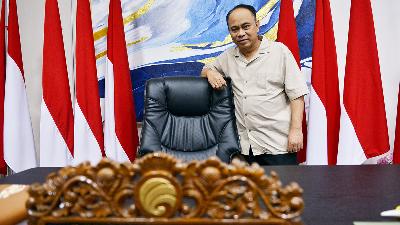
Communication and Informatics Minister Budi Arie Setiadi talks about the polemic over the planned revision of the Broadcasting Law and the Starlink Internet service.
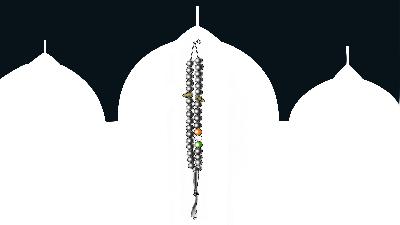
Narendra Modi is likely to serve his third term as the Prime Minister of India. His campaigns are based on populism and religion.
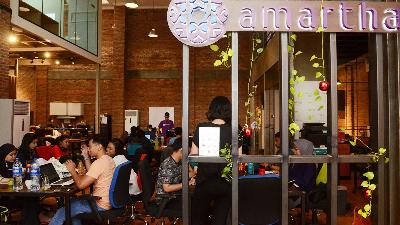
The fintech lending business is increasingly losing steam. Returns continue to decline while fund owners are opting for other investment portfolios.

Tourism and Creative Economy Minister Sandiaga Salahuddin Uno assures that the tourism fee will not be imposed on plane tickets.
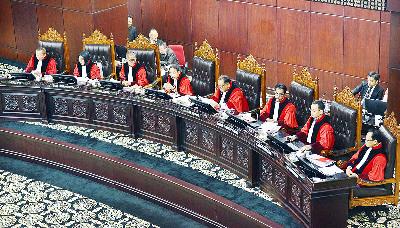
The Constitutional Court rejected lawsuits disputing the results of the 2024 presidential election. The option of disqualifying Gibran was discussed in a meeting of the judges.
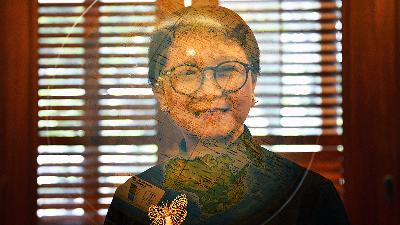
Foreign Affairs Minister Retno Marsudi explains the Gaza war and the Iran-Israel conflict with its impact on Indonesia’s economy.
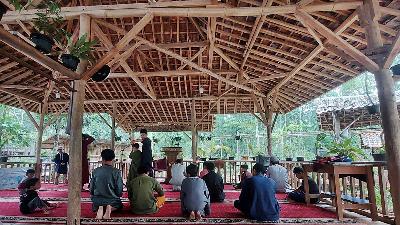
Islamic boarding schools (pesantren) cannot be closed even if they do not have a license from the government. There is no protection from the Ministry of Religious Affairs if legal problems arise.
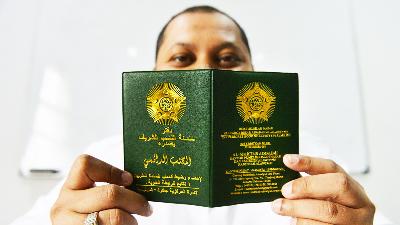
The Rabithah Alawiyah organization is in charge of recording and preserving the line of descent of the Alawiyyin in Indonesia. Seven books from Yemen serve as their guide.
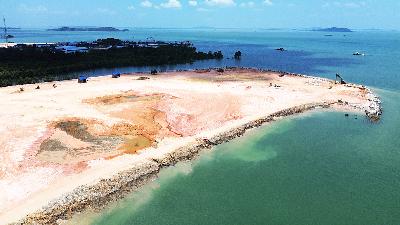
Several companies are applying for permits to utilize sediment, including sea sand. Large corporations use landfills for land reclamation areas.

Indigenous people are taking legal action against the President and the DPR for delaying deliberations of a bill. It has taken second place to the interests of investors.
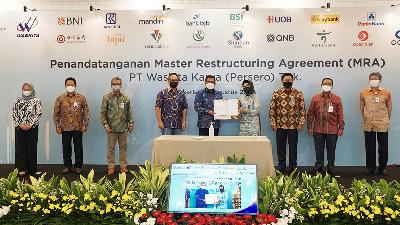
State banks stop distributing loans to state construction companies. Government assignment projects are burdening banks.
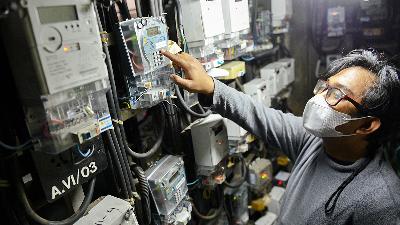
The government opens the option of switching energy subsidies for the free lunch program. This threatens poor households.

The government issues a regulation to develop the game industry. There will be a special funding agency.
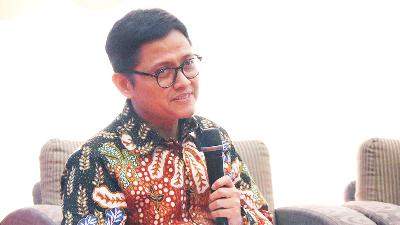
Discussions of the Asset Recovery Draft Law is stagnating in the DPR. It is key to preventing money laundering.

TikTok Shop’s acquisition of Tokopedia changes the Indonesian business map. It is not clear how small and medium enterprises will be protected.
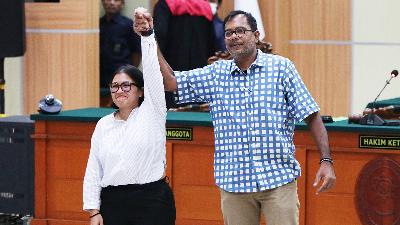
The prosecutor persists in filing a cassation against the acquittal of Haris Azhar and Fatia Maulidiyanti. It is a threat to the freedom of expression.

GoTo CEO Patrick Waluyo reveals the story behind the selling of Tokopedia shares to TikTok. How much profit did GoTo get?
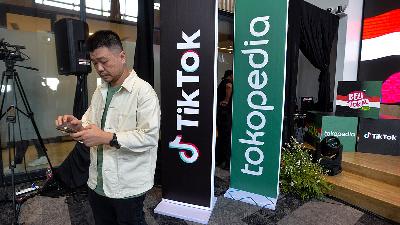
The integration of TikTok Shop with Tokopedia will reinforce GoTo’s business. Indonesia’s e-commerce competition landscape is changing.

The presidential and vice-presidential candidates are relying entirely on gimmicks to exploit the emotions of the people. This moves the campaign away from substantive discussions.

Do the presidential candidates succeed in attracting young voters with social media gimmicks?
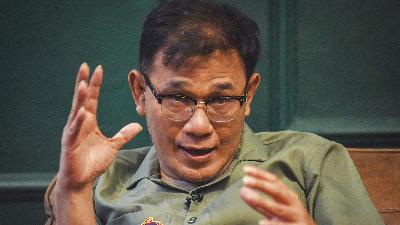
Budiman Sudjatmiko persuades other activists to support Prabowo Subianto. He claims he is not motivated by money.
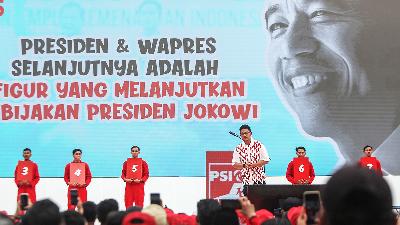
How does the Indonesian Solidarity Party get its funding? Is the aid from conglomerate bosses like Djarum’s owner true?

Presidential Chief of Staff Moeldoko is writing regarding his alleged interference in electric vehicle policy over Wuling’s SNI certification.

Post-Firli Bahuri, the Corruption Eradication Commission (KPK) is still walking backward toward its grave. A radical reform is needed.

The presidential candidates’ campaign teams are an illustration of the type of government they would form if elected. Businesspeople have a central role.
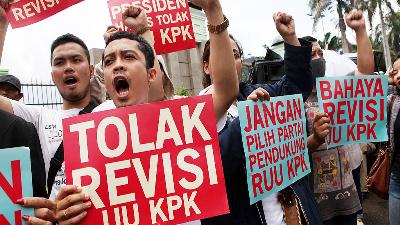
The Corruption Eradication Commission is no longer independent ever since it became part of the executive body. The fruit of the revised KPK Law.
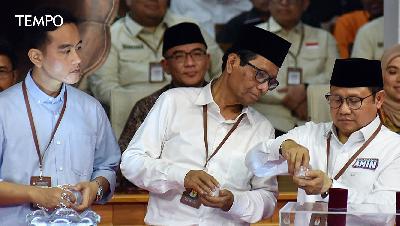
In Indonesia, presidential candidate debates are planned as bogus performances. There is no in-depth discussion of the issues.

Yet again, a member of the Supreme Audit Agency is involved in corruption. The system for selecting these state auditors is very poor.
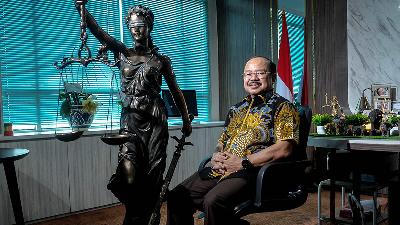
Judicial Commission Chairman Amzulian Rifai explains the boundaries of his authority in dealing with judges, and the Judicial Commission Bill.
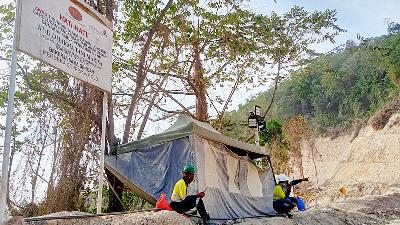
Sandiaga Uno and Garibaldi Thohir’s company is in conflict with local miners. The amount of compensation is considered inadequate.

Having no democratic legitimacy, Gibran Rakabuming Raka must withdraw his candidacy for the vice-presidency.
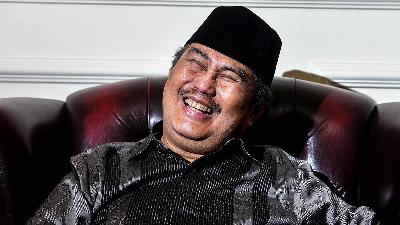
Tempo's special interview with MKMK Chairman Jimly Asshiddiqie regarding the dismissal of Anwar Usman as Chief Justice of the Constitutional Court.
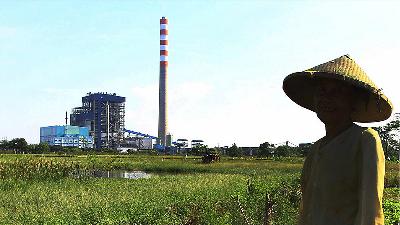
The program to put coal-fired power plants (PLTU) into early retirement is hampered by funding problems. As grants are stuck, the state budget must be disbursed.

Nepotism is the close relative of corruption and dictatorship. The Indonesian Independence Proclamation places nepotism as a threat to independence.
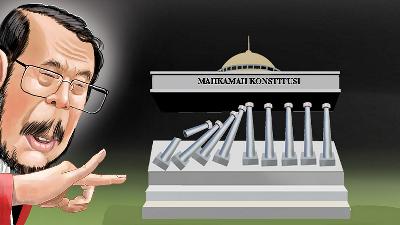
Constitutional Court Chief Justice Anwar Usman is reportedly maneuvering to lower the minimum age limit for presidential and vice-presidential candidates, paving the way for Gibran.
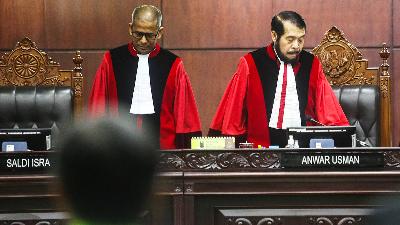
The Constitutional Court reportedly already made a decision in favor of a lawsuit regarding the minimum age requirement for presidential and vice-presidential candidates. The issue is rife with conflicts of interest.

Carbon trading is simply a way to mitigate climate change. The main aims are the energy transition and environmental protection.
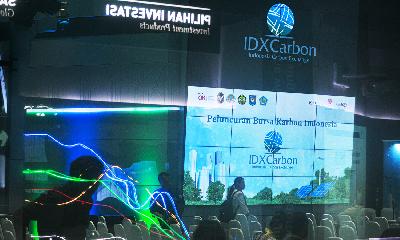
The Indonesian Stock Exchange established four carbon trading mechanisms. There were 27 transactions in three schemes in the initial sale.

Presidential candidates’ supporters are creating unfavorable atmosphere in the build-up to the 2024 general elections with them more inclined to speak about rivals’ weaknesses than promoting their champions’ profiles.
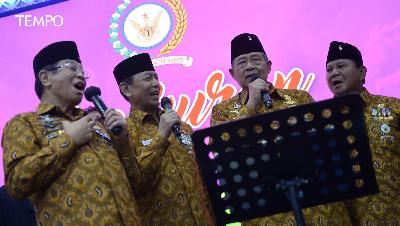
The 2024 presidential candidates are competing to garner support from retired generals. This perpetuates the militaristic nature of Indonesian politics.

The plan from the OJK to introduce carbon units as securities could lead to problems. Carbon trading no longer means a reduction in emissions.

The three soldiers who allegedly killed a civilian should be tried in a criminal court. The Military Courts Law needs to be revised.

The OJK regulates carbon exchanges as a securities trading platform. How will the OJK prevent greenwashing in the carbon exchange?

The news in our media is problematic. Why is that?
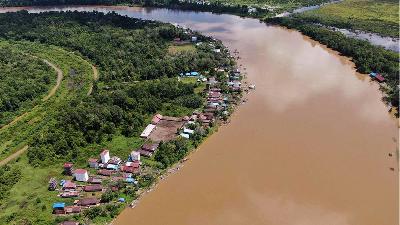
Voluntary carbon trading has stopped since 2021, due to upside down policies.
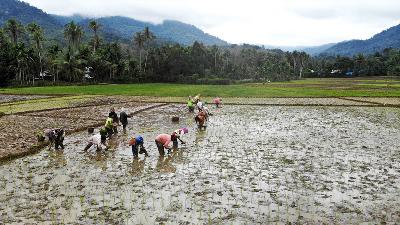
Individuals and companies are already implementing carbon trading in the voluntary market. But no price standard has been set.
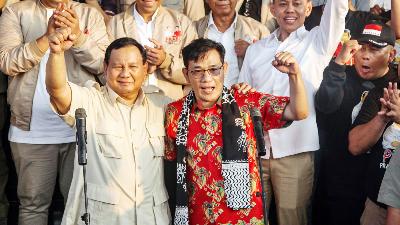
News summary, from the dismissal on Budiman Sudjatmiko to Food Estate.
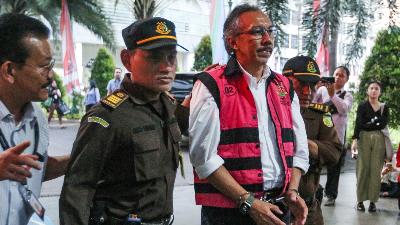
Former Director-General of Mineral and Coal, Ridwan Djamaluddin, is named as suspect in the Mandiodo Block nickel corruption case.
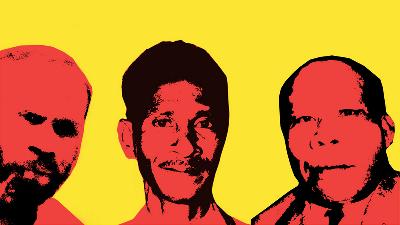
Why did the prominent figures from Papua fail to bring the Papuans to support the Republic of Indonesia?
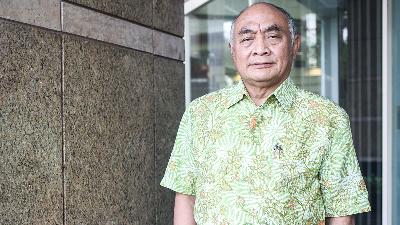
The government faces difficulties accommodating kidney donors and recipients. The need for kidney donors is high, but the supply is very limited.
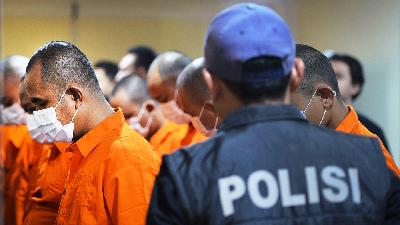
The police exposes Indonesian kidney trafficking network in Cambodia. The victims are enticed through social media.

The Holywings group is opening a new outlet in Bali. The new location is integrated with a hotel and swimming pool.
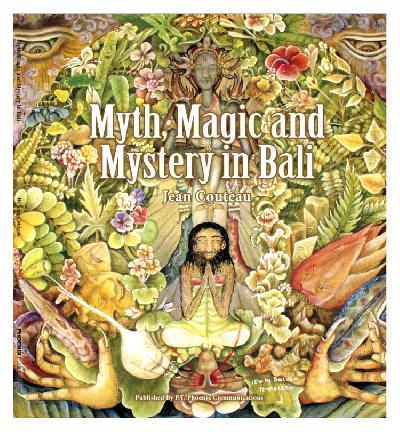
The vivid cover of the square-format book immediately catches one’s attention and the fact that the author, Jean Couteau, is not Balinese.

Nyoman Gunarsa (1944-2017) cared about painting Balinese ornaments and dancers the very things that brought him success. He also established museums to preserve both modern and traditional Balinese paintings.

Many people know who Ali Imron is. He got his battle and bomb-making training in Afghanistan from 1991 to 1996, and was one of the bombers of Paddy's Pub, Sari Club, and the United States Consulate in Denpasar on October 12, 2002. A total of 202 people died, and 209 more were injured as a result of the bombs detonated at those two famous clubs in Bali--the largest amount of casualties for a single terrorist attack in Indonesia.

A young Balinese has initiated an anti-tobacco community aimed at spreading awareness on the dangers of smoking among children. The community has 47 members.

Indonesia and the European Union (EU) held the second round of negotiations for a Comprehensive Economic Partnership Agreement (CEPA), on January 24-27 in Denpasar, Bali. Iman Pambagyo, director-general of international trade negotiation at the Ministry of Trade, said the negotiations would serve as the basis for future discussions.
"This round is a follow-up to synchronize perceptions of each participant's ambitions as well as to clarify draft suggestions from each delegation," he said, adding that more comprehensive negotiations are expected in the third round.

Indonesia and the European Union (EU) held the second round of negotiations for a Comprehensive Economic Partnership Agreement (CEPA), on January 24-27 in Denpasar, Bali. Iman Pambagyo, director-general of international trade negotiation at the Ministry of Trade, said the negotiations would serve as the basis for future discussions.
"This round is a follow-up to synchronize perceptions of each participant's ambitions as well as to clarify draft suggestions from each delegation," he said, adding that more comprehensive negotiations are expected in the third round.

Leonard Lueras has spent more than half his lifetime traveling across this "incredibly rich and great archipelago," as he described Indonesia, and publishing books about it.
"I'm one of the [few foreign] journalists or writers who actually live here," the 71-year-old American veteran journalist told Tempo English. He has lived in Bali for over 40 years.
Tempo English spent an afternoon chatting with Lueras in his uniquely designed and beautifully curated two-storey home at a villa compound in Sanur, Bali.

Stacks of planting medium called baglogs were neatly placed in a 150-meter square area, surrounded by walls made of woven bamboo. There were 6,000 baglogs in the room, each of them filled with white oyster mushrooms.
Ni Wayan Purnami Rusadi, 25, checked each growing medium, carefully picked mushrooms that were big enough, and put the harvested products in a basket. "These are all ready to be sold," she told Tempo English at her home in the Peguyangan Kaja village near Denpasar, Bali, two weeks ago.

Deborah Gabinetti is quick, gregarious, and emotivean immediate presence as soon as she enters a room. Yet she gives the impression of someone who is used to listening and observing. She will stop in the middle of a story to check your reaction, is not afraid to let pauses linger, tilts her head at you when curious to know what your take is on a situation and persists until she receives an answer.
When Tempo called Balinale's hotline to inquire about the festival, it was Gabinetti who answered the call. "This is Deborah. The director of the festival. Yes, I'm picking up calls," she said, laughing heartily, when asked who was on the other end of the line.

All was quiet at the Royal Bali Beach Club Hotel, Sanur, Bali, on Thursday two weeks ago. Just four foreign visitors could be seen sunbathing by the pool. Even so, according to the receptionist, all 32 rooms were occupied. "Only Royal Bali members can stay here," said the woman. But that turned out to be a false statement, as even non-Royal Bali members could be squeezed in.
Today, 12 expatriates are suing Permata Bahari, a hotel marketing company, and Royal Karma Development, the building owner. They are demanding that the two companies pay some US$76,000 in compensation plus Rp10 billion. "As long as they've been members, they've never been able to enjoy their rights," said Sylvia Maladi, the plaintiffs' attorney, last week.

The 6th Ministerial Conference on the Bali Process, held in Nusa Dua, Bali, on March 22-23 and co-chaired by Foreign Minister Retno Marsudi and her Australian counterpart Julie Bishop, resulted in a regional mechanism on irregular migration. The agreement, called the Bali Declaration of People Smuggling, Trafficking in Person and Related Transnational Crimes, reflects the commitment to take swift and concrete action when these issues arise.
"Through this mechanism, the co-chairs can build communication with the relevant countries including the country of origin, transit country and destination country, in case of any emergency," said Retno in an official statement.

Browsing the wine shelves of Bali reveals local brands as well as imports at fantastic prices. Hatten and Sababay Winery are the most common Indonesian varieties, found in beverage shops, hotels and restaurants, including Ngurah Rai Airport in Denpasar, Bali's provincial capital. "They're usually bought as souvenirs," an assistant at Puri Garden Wine Shop said. They are also available at Bebek Bengil Restaurant in Ubud and Vin+ in Seminyak.
Local wines are emerging in Bali. The pioneer was Hatten Wines, founded by Ida Bagus Rai Budarsa in 1992 but only effectively engaged in market distribution in 1994. After graduating with from Brawijaya University in Malang, East Java, in 1990, Rai was asked by his father to continue the family business of Dewi Sri Bali brem, a drink made from fermented rice. "It's the responsibility of the oldest son," Rai said. The company, set up in 1968, could produce 5,000 liters of brem per month.

Two jalak bali birds (starlingLeucopsar rothschildi) were perched on a cashew tree in a garden in Ped village, Nusa Penida, Bali. Though just 15 centimeters tall, the birds could be clearly seen in the dense foliage. Their clean white feathers contrasted with the green leaves. Black strips adorned their wings and tails. Their blue eyes seemed like those of a mask. "The jalak bali birds are hunted for their beautiful feathers. They can fetch Rp50 million a bird," said Sudariyanto, a researcher at Gajah Mada University.
After vanishing in 2004, the jalak bali has returned to Nusa Penida, a 200-square-kilometer island southeast of Bali. Finding them can be difficult, the way they hide among the trees, but in Ped the birds are known to frequent Puseh Temple. The temple stands on a hill from which one can see half of Nusa Penida. Jero Mangku Sujana, who lives 100 meters from the temple, said he can spot the jalak at the temple from 5am to 9am.

Bali Holds International Cocoa Festival
Balis Jembrana regency hosted a festival for cocoa farmers from various countries from August 27-30. Present at the event were farmers from Aceh, Lampung, Sulawesi, West and East Nusa Tenggara and Papua. Farmers also came from Vietnam, Timor-Leste and the Philippines.

Unlike other teenagers in Denpasar, Bali, Tami Grende will not be found at the popular franchise outlets many of them frequent after school. As soon as the last bell rings at 3pm, the 17-year-old girl dashes home to prepare for yet another routine: practicing tennis strokes with her father, Olivier Grende. They go until 7pm.
The tennis court Tami and her father use lies just 200 meters from their house in Suwung, Denpasar. In the same field, Tami usually begins her day under the red morning sun with jogging and agility drills. Then she leaves for school. Tami has been doing this since she was eight.

Pigs' squeals pierced the air at I Wayan Darmawan's ranch. About 80 of the animals were lined up in wooden pens at his place in Kampung Pengotan, Bangli regency, Bali. At first glance, the pens looked different from others in the area. A large cement dome was protruding from the ground near it. The object was a digester, a device that produces gas from animal waste. It has been up and running for eight months. "I use this gas to cook and heat water," he said.
In the past, Darmawan would buy seven three-kilogram tanks of liquid petroleum gas (LPG) at a time for the kitchen of his seven-member family. He paid Rp16,000 per tank. In addition saving him money on gas, the digester also provides him with organic liquid, which he uses on his orange grove. "My monthly costs have gone way down," he told Tempo.

Several high schools in Bali have banned the Islamic headscarf. The government is preparing to issue a ministerial regulation.

I Nyoman Miska Karyana in Denpasar cultivates various types of original plants of Bali. After ten years of efforts, his garden contains 30 types of unique plants, now used to decorate hotels and villas in Bali.

With very little fanfare in the national press, the Ubud Writers & Readers Festival celebrated its 10th gathering last week in Bali, with a lineup of 174 writers from as far afield as Finland, Zimbabwe, Lebanon and Mexico, plus 16 of Indonesia's most exciting young writers.

Jero Wacik ignored the outcome of an economics coordination meeting. Gas from the Husky-CNOOC field will still be diverted to Bali.

I Made Taro finds, catalogs and teaches ancient Balinese games. He's also invented some of his own.

Bali is known for its deep commitment to the arts. Yet, a number of classical works in the nation's only majority Hindu population face extinction, outnumbered by instant commercial art in the interest of profits. A number of concerned cultural experts are now trying to conserve these classical art traditions, and pass on their talent and experience. Fortunately, the endeavor is finding support among an enthusiastic young generation. Today, they are regarded as the vanguards of art conservation in Bali. Tempo English reports on their activities in Bali, in commemoration of National Children's Day, July 3.

A tsunami could hit Bali's north and south. Mitigation efforts along the northern coast are still minimal.

Price increases for land and property in Bali have been extraordinary over the past two years. Many foreign investors are opting for underhanded methods.

An alcohol trade both old and new is flourishing in Bali.

Bali-based, American-born writer Bill Dalton, who has lived in Indonesia for more than four decades, and his Indonesian wife decided to convert to Bali Hinduism last year. The following is a description of his unique experience.

Ever since the eccentric Dutch painter W.O.J. Nieuwenkamp first toured the Island of the Gods by bicycle in 1906immortalized on a stone bas-relief in a temple at Kubutambahan in north Balicycling has been a popular outdoor recreation across the island.

The term subak has been known since the 11th century. Balinese communities, as well as the colonial Dutch and the Indonesian government have helped shaped today's subak over the years.

Last March, Bali hosted a major Food, Hotel and Tourism exhibition. The island of the gods seems limitless when it comes to innovations to lure visitors. One unique creation featured at the exhibition was the non-grape wine. The raw materials are extracted from fruits and other food items, like the salak, ginger, sweet potatoes and cashew nut. Most importantly, this unique Balinese wine has improved the livelihood of local farmers. What are its future prospects? Tempo English reports from Bali.

The Balinese Art of Ogoh-Ogoh documents one of Balis newest and most unique art formsthe Ogoh Ogoh.

A farmer cooperative in Baliem Valley succeeded in exporting coffee abroad, at the same time improving the welfare of local residents.

In his latest exhibition, Rio Helmi presents the ethnic beauty of today’s Bali through his eyes.

A BPPT expert earned a promotion by creating an electrical current stabilizer to help the flow of power from Java to Bali. His product costs far less compared to the German-made alternative.

A colony of street children in Badung, Bali, peddles fruits to cover family expenses. Their minimum access to education exposes them to exploitation.

The ban on screening Balibo recalls the 1975 deaths of five foreign journalists in East Timor. One witness of this incident, a former intelligence officer, believes the element of dramatization is inevitable, resulting in a fictional film featuring images of a brutal military.

The Indonesian Film Censorship Board banned the screening of the film Balibo at the 11th Jakarta International Film Festival, reasoning that the film might reopen old wounds.

A larger-than-life character is still referred to in Denmark as ‘the King of Bali.’

The authorities have not yet decided when to carry out the execution of those sentenced to death for the Bali Bombing. Here is a glimpse of their activities at Nusakambangan Prison.

Only five Bali Starlings remain in their wild habitat as last-ditch efforts are in full gear to save the endangered species.

Kepaon village is evidence that tolerance can be maintained for many years. Bali bombings once tore this tolerance apart.

Azahari made thorough preparations for the second Bali bombing. This was discovered in a document which fell into the hands of the police.

Tracing the performing arts in Bali from the religious background, through the learning, the actual performance, to what they mean in todays Bali.

There are no queues at the Bali airport and hotel occupancies are starting to decline.

At least 25 died and hundreds were injured as a result of the weekend bomb blast in Bali, again. President Yudhoyono had received reports of terrorism threats back in July.

An interesting part of Covarrubiass wanderings in Bali was his curiosity about the riddle of the leak, Balinese evil spirits.

His success in breaking open the Bali bombing network is likely to take Pastika on to a ministerial position. But he has yet to be contacted by the PDI-P.

President George Bush's brief stopover in Bali produced quite a hassle, but also some hopes and promises.

Allegations of money politics in Bali's recent gubernatorial election should be thoroughly investigated, particularly since the donor and the recipient have owned up to the fact.

The Regent of Buleleng faces opposition for approving a project in one of Bali's tourism zones.

Ali Imron has given his version of the Bali bombings. Many questions still remain unanswered, however.

The Chairman of the Indonesian Bank Restructuring Agency (IBRA) invited all tycoon debtors for face-to-face meetings in Bali. IBRA’s stern approach has changed to one of peace.

Hundreds perished in Bali, but cabinet members can only squabble over the tragedy. Has the government been slow in handling this?

The bombing tragedy in Bali has shaken Indonesia’s economy. Will this impact be temporary or long term?

BI governor Syahril Sabirin is finally in court over the Bank Bali corruption scandal. But will he be acquitted like those before him?

Villages in Bali are applying custom law to various trials of cases, but doesn’t that contradict state laws?

Gambling is now mushrooming again in Bali. Those who call themselves community figures now even approve of the long prohibited cockfights.

The Right of Reply of Korindo Group

Askrindo has been undermined by alleged embezzlement totaling up to Rp200 billion. The payment of claims was overstated so the directors could benefit.
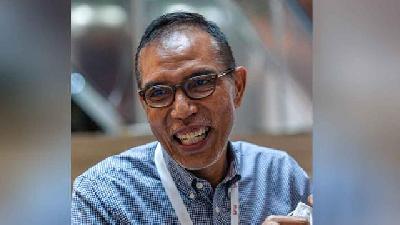
Investigation by an audit committee formed by Askrindo's board of commissioners of the company’s finance in 2019 found indications that the commission paid to Askrindo Mitra Utama (AMU), a subsidiary which is also an insurance sales agent, was a cover for bribes to the company board of directors. Robertus Bilitea, Chief Executive Officer of Indonesia Financial Group (IFG), a state-owned insurance holding company, answered Tempo’s questions regarding the alleged corruption within one of IFG’s subsidiaries.

The phrase "the desert of the real" conveys that ‘the real’ is the destroyed world, gloomy, fantastical, inexplicable through language, especially when viewed from the ordered world. In Indonesia, we are actually in that ‘desert’: with incessant floods, landslides and earthquakes.

AFTER reading and studying Tempo of the November 3-9, 2020 edition, as General Chairman of the Indonesian Fresh Food and Vegetables Exporter-Importer Association (Aseibssindo) I herewith convey the following matters as a response and an exercise of our right of reply.

Indonesia finished whole-genome sequencing of the SARS-CoV-2 virus circulating in the country. Virus samples from Indonesian patients indicate they are part of the dominant group globally.

Richard Joost Lino, the current CEO of state-owned Pelindo II, is known for his straight talk and penchant for betting. This is evident in how he faces challenges and opposition, whether from his own employees, his colleagues or even government ministers. Recently, Lino was reported to the police by Indonesian Democratic Party of Struggle (PDI-P) politician, Masinton Pasaribu, who is also a former Corruption Eradication Commission (KPK) official, for allegedly giving a gratuity to State-Owned Enterprises Minister Rini Soemarno.
The public is unlikely to forget how Lino stood up against Coordinating Minister for Maritime Affairs and Natural Resources Rizal Ramli, also known for his sometimes injudicious language, over the damage at the port area caused by a project overseas by Rizal, as well as charges that Lino used State funds to place ads in a number of major media organizations.

Transportation Minister Ignasius Jonan has asked that the decision of Richard Joost Lino, CEO of state-owned shipping company Pelindo II, to extend the operations contract with Hutchinson at the Jakarta International Container Terminal, (JICT) be ignored. The criteria for the contract extension, according to the law on shipping, contradicts it. Today, Jonan admits he is in the process of drafting a legal action against Lino's desperate move. "If we find any violation, the amendment to the contract will be cancelled," Jonan told Tempo reporter, Khairul Anam, who met him at his office on July 7.

Lapindo Brantas is about to restart producing gas in Sidoarjo. It faces strict requirements over concerns of a recurring Porong incident.

His return to Pelindo II was greeted by protesting employees. He is convinced that in 10 years time, Tanjung Priok will be double the size of Hamburg or Rotterdam ports.

A legal challenge on the use of state funds to compensate victims of the Lapindo case lost at the Constitutional Court.

As Tempo Inti Media celebrates its 40th anniversary, Tempo English features prominently alongside the company’s other media products, to provide insight and information to the growing number of expatriates in Indonesia and ‘Indophiles’ in the ASEAN region and beyond.

A new book takes a fresh look at the 1965-66 mass killings in Indonesia.

Something is not right with the police order to stop the Lapindo case investigation. Will this mean the end of their legal efforts?

On Friday two weeks ago, the gush of underground mud in Porong, Sidoarjo, some 200 meters from the Banjar Panji I gas exploration well owned by PT Lapindo Brantas, was exactly three years old. Fifty thousand people in 12 villages were rendered homeless by the disaster. This could be only the beginning of the tragedy. In March, a ring dam surrounding the source of mud collapsed as the earth beneath subsided. A daily flow of 100,000 cubic meters of mud is now directly impacting the external dam as the only dividing wall between 64 million cubic meters of mud and settlements. If this 3-meter-wide fortress gives way, a calamity like that in Situ Gintung, Tangerang, may recur.

The Bakrie Group is willing to pay the long-overdue payment of the outstanding 80 percent compensation for victims of the Lapindo mudflow disaster. However, this does not mean that the compensation issue is settled. Thousands of Sidoarjo residents are still rejecting this payment scheme.

Police deferred to send the Lapindo case dossier to court, even though they still believe the mudflows were caused by human error.

Lapindo considers Medco’s letter about installing pipe casing to be misleading. The credibility of the company belonging to the Panigoro family is at risk.

Nine months after the Lapindo mudflow inundated the plains of Sidoarjo, making 10,000 people homeless, the National Mudflow Management Team still faces a mountain of tasks. But why must the government bear the Rp7.6 trillion relocation costs?

The directors and commissioners, also the shareholders can be sued in the Lapindo mudflow case.

Lapindo is officially separated from Energi Mega Persada. It wont be easy for Bakrie to regain lost trust.

Lapindo is officially separated from Energi Mega Persada. It wont be easy for Bakrie to regain lost trust.

EVERY day, 75,000 new web logs or blogs are created in cyberspace. At least 1 million pieces of information emanate from these blogs every day. Of course, not all of them contain important news; there is a virtual flood of trivial tales.
But a new wave is beginning to appear: the bloggers are beginning to write like journalists. They take part in providing the latest information on all sorts of eventsin addition to making special analyses. The tsunami that swept across the south shores of the Island of Java, a month ago, for instance, had filled the blogosphere just a few moments after it happened, and even before television could report on it. Even before this, CNN had no problem quoting a number of postings from Iraqi bloggers when America began its invasion.
Undeniably, the blogs have taken on a new role: opening new windows of information for the citizens of the world.

From Port Klang, Malaysia, cheap sugar flows into Indonesia through ports of entry in Sumatra.

Interest in studying Indonesian in Australia has regained momentum following innovative and creative teaching techniques.

Indosat, Satelindo, and IM3 are to merge. Is it true this move will be profitable?

Farwiza Farhan, the winner of the 2024 Ramon Magsaysay award talks about conservation of the Leuser Ecosystem in Aceh.
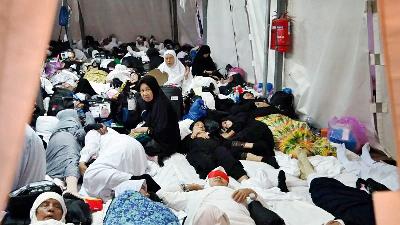
During the 2024 haj pilgrimage in Mina, some pilgrims were forced to sleep in cramped conditions. Some of accompanying haj officials did not go through a selection process.
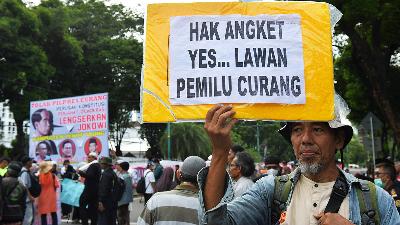
The right of inquiry to investigate alleged fraud in the 2024 elections is threatened to run aground in the House of Representatives (DPR), influenced by offers of ministerial seat in Prabowo’s cabinet.

The presidential election is not over yet. The lawsuit in the Constitutional Court shows that something is wrong in the 2024 presidential election.

Under the leadership of Airlangga Hartarto, Golkar sees a significant increase in votes during the 2024 General Elections. Part of it is due to the Jokowi effect.

The 2024 election debates should include culture and academic as themes, with the latter necessarily coming out of a concern how easy it is to obtain a doctoral degree.
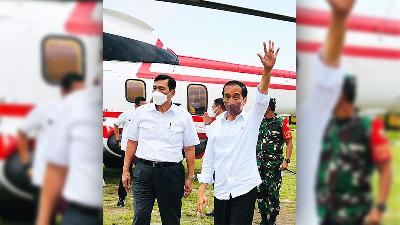
Ministers and senior officials from the government coalition are calling for the 2024 elections to be delayed. Like those of Sukarno and Suharto, Jokowi’s presidency could end in tragedy.
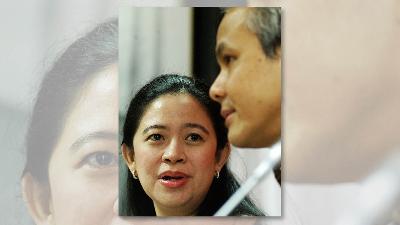
It is reported that President Jokowi gives the green light to a number of prospective candidates wanting to stand for the presidency. Is he seeking political protection post-2024?
Independent journalism needs public support. By subscribing to Tempo, you will contribute to our ongoing efforts to produce accurate, in-depth and reliable information. We believe that you and everyone else can make all the right decisions if you receive correct and complete information. For this reason, since its establishment on March 6, 1971, Tempo has been and will always be committed to hard-hitting investigative journalism. For the public and the Republic.